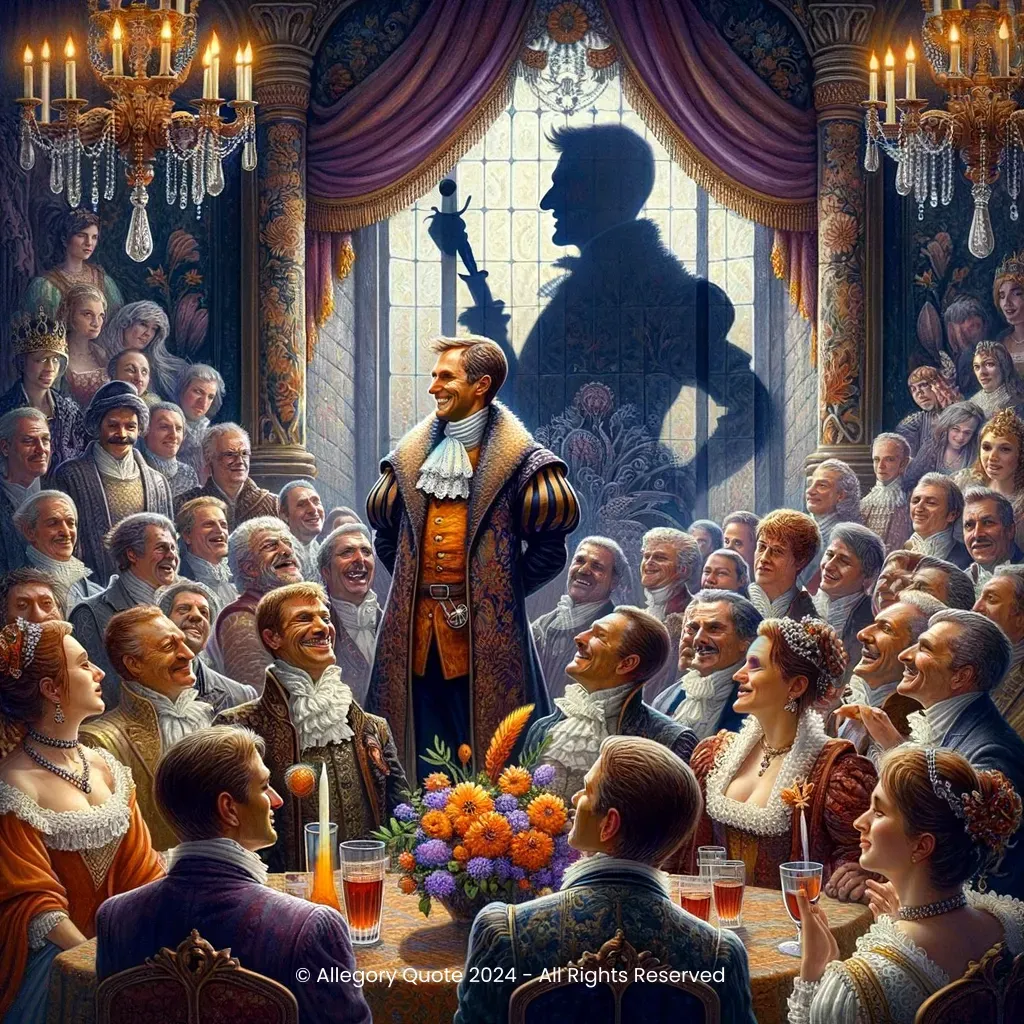There's daggers in men's smiles

0
0
0
0
- Meaning
- This phrase metaphorically means that not everyone who smiles at you is your friend. Behind a seemingly friendly demeanor might lurk treacherous intentions. It highlights the theme of deceit and the idea that outward appearances can often be misleading, which is a recurring theme in human relationships and societal interactions.
- Allegory
- The medieval court and finely dressed nobles set the scene of opulence and grandeur, aligning with the societal context where appearances are crucial. The dignified figure's radiant smile represents outward friendliness, while the dagger-shaped shadow symbolizes concealed danger and treachery. The cautiously recoiling figure signifies awareness and vigilance against deceit. Rich tapestries and ornate decorations enhance the façade of noble splendor, whereas the poisonous plants among vibrant flowers subtly hint at the hidden malice beneath the beauty. These elements collectively depict the phrase’s warning about deceptive appearances in human relationships.
- Applicability
- In personal life, this teaching serves as a cautionary reminder to be discerning and cautious in trusting others. Remembering this adage could help individuals be more aware of potential deceit and encourage them to observe actions over words. It's a reminder not to take everything at face value and to look deeper into people's intentions.
- Impact
- This phrase has had a substantial impact on literature and popular culture. It is often quoted in discussions about trust and betrayal. The idea it conveys has also permeated other literary works, films, and everyday conversations, reminding people of the potential duplicity in social interactions.
- Historical Context
- “Macbeth” was written in the early 17th century, around 1606. The play reflects the political tension of Shakespeare’s time, particularly regarding the Gunpowder Plot of 1605, which was an attempt to blow up the English Parliament and assassinate King James I. The themes in "Macbeth", including betrayal, ambition, and deception, speak to the uncertainties and fears of that period.
- Criticisms
- One potential criticism could be that the phrase fosters suspicion and mistrust, which could negatively impact personal relationships. Overemphasis on this perspective may lead to paranoia, where innocent actions might be misinterpreted as deceitful.
- Variations
- Variations of this phrase can be found in other cultures where proverbs about deceit and hypocrisy exist. For example, the Arabic proverb "From a dog's mouth comes no ivory" conveys a similar mistrust of appearances.
-

To weep is to make less the depth of grief.
-

Things without all remedy should be without regard: what's done is done.
-

No legacy is so rich as honesty.
-

Hannibal ante portas.
-

If to do were as easy as to know what were good to do, chapels had been churches, and poor men's cottages princes' palaces.
-

Come, gentlemen, I hope we shall drink down all unkindness.
-

Suspicion always haunts the guilty mind.
-

If to do were as easy as to.
-

What is past is prologue.
-

know what were good to do, chapels had been churches, and poor men's cottages princes' palaces.
-

Some rise by sin, and some by virtue fall.
-

I am a man more sinned against than sinning.
No Comments